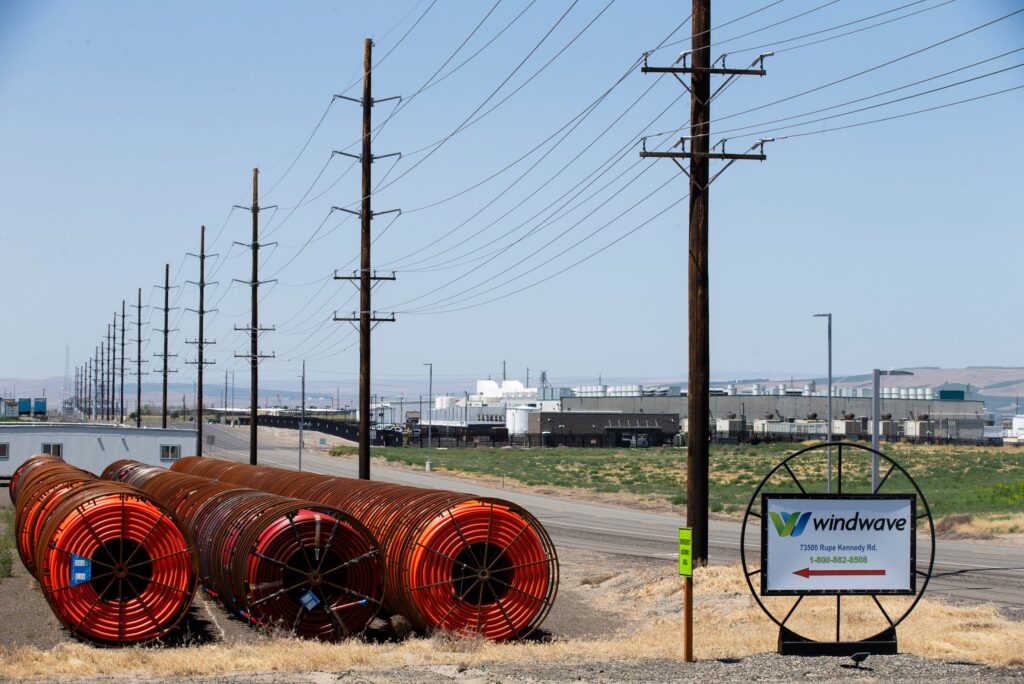The Oregon Department of Justice says officials in Morrow County bought a fiber-optic business from a local nonprofit at a lowball price, improperly capitalizing on Amazon’s booming data center business in the small community and generating a windfall for themselves.
“You have people in this situation who knew that this company was undervalued and sold it to themselves and misled folks for personal gain,” said Attorney General Dan Rayfield.
A civil complaint filed Tuesday accuses
eight people
, including four former officials in Morrow County and a state legislator, Rep. Greg Smith, of exploiting a nonprofit called Inland Development Corp., which was founded at the beginning of the century to provide internet access to rural schools, hospitals and government offices.
>>
Windwave: Here are the defendants
Five of the defendants purchased an associated fiber-optic provider called Windwave Communications from the nonprofit. They paid $2.6 million for it but the justice department says Windwave was really worth at least $9.5 million – triple what the insiders paid – because Amazon was its biggest customer. All eight defendants served on Inland’s board, either shortly before the sale or during the transaction.
“You had inside actors within Inland, with knowledge about the valuation of one of their businesses that they were selling off,” Rayfield said. “The interesting component of this they were selling it to themselves.”
Tuesday’s litigation follows a three-year investigation by the Department of Justice, which was
triggered by a 2022 report by The Oregonian/OregonLive
that scrutinized public officials’ dealings in Morrow County.
>>
Windwave: A timeline of the case
Windwave’s buyers, all named as defendants in Tuesday’s lawsuit, include Port of Morrow commissioners Marv Padberg and Jerry Healy; the port’s director, Gary Neal; and a Morrow County commissioner Don Russell. All have since left their offices. The complaint also names Windwave’s CEO, Blake Lawrence, who shares ownership of the business with the four former public officials.
Attorneys for the defendants didn’t immediately respond to calls seeking comment Tuesday afternoon, or else declined comment.
Morrow County is a small community of about 12,000 people 160 miles east of Portland along the Columbia River. It’s home to large farms and food processing businesses as well as an enormous constellation of Amazon data centers.
The Seattle company has invested billions of dollars in recent years building its huge server farms and continues to expand. Morrow County officials awarded Amazon tax breaks worth more than $330 million since 2017.
The news organization’s investigation in 2022 found public officials in Morrow County had awarded tax breaks and arranged property sales to Amazon, which then contracted with Windwave to provide fiber-optic service to its data centers. The officials benefited personally from that arrangement by purchasing Windwave.
“They deliberately withheld financial information, including information about lucrative new business opportunities with Amazon Web Services, to manufacture an artificially low valuation of Windwave,” according to Tuesday’s complaint.
All five owners served on Inland’s board but three resigned as they were negotiating to buy Windwave from Inland. The complaint alleges the buyers recruited three replacements with whom they “had longstanding personal, professional, and governmental ties.”
The justice department says the newly seated board didn’t properly scrutinize the transaction and signed off on the low price, benefiting the five insiders who acquired Windwave. The suit seeks to force Windwave’s owners to pay $6.9 million to compensate Inland, or possibly to undo the deal.
It also seeks attorney fees from the defendants and raises the possibility that the state may seek punitive damages, too.
“Nobody should profit off of these types of transactions,” Rayfield said.
Windwave and Inland are also named as defendants in the case but Amazon is not. Rayfield said the Department of Justice is continuing to explore the tech giant’s role.
“Certainly, Amazon was benefiting from the business deals they were getting. It created an economic incentive to be in the area. They chose to make those internal business decisions and be in the community based upon those things,” Rayfield said.
“Were they complicit in the insider dealing that was going on here?” he asked. “I just don’t have facts to say one way or the other in that space.”
Amazon didn’t have an immediate comment on the case Tuesday. In the past, the company has said it acted appropriately in Morrow County.
Amazon has never said, though, whether it was aware that some of the officials who awarded tax breaks to the company also owned Windwave, one of Amazon’s key local vendors.
Last year, Padberg, Healy and Russell each
agreed to pay $2,000
to settle charges by the Oregon Government Ethics Commission. The ethics commission alleged that the three had sometimes failed to disclose ways in which their dealings with Amazon as public officials may have conflicted with their ownership of Windwave.
Tuesday’s suit also names the three Inland directors who joined its board as the deal was being negotiated. One of them, Rich Devin, didn’t show up for the nonprofit’s board meeting on the day the sale was approved. Another, state Rep. Greg Smith, was allegedly inattentive at the meeting, according to the state’s complaint.
Inland’s attorneys recommended the nonprofit seek a “fairness opinion” from an outside party to ensure the deal was above board. The complaint says the defendants “ignored their lawyer’s advice.”
The complaint alleges that Windwave was entering “a new era of unprecedented profits” at the time of its sale, “because its single largest customer (Amazon) intended to build numerous, large-scale data centers in northeastern Oregon.”
Nonprofits are meant to benefit the public, according to Rayfield, and receive tax exemptions and other considerations as a result. He said it’s the state’s job to ensure nonprofits’ assets are used to help the whole community and not just the people running the organization.
Tuesday’s litigation aims to return to Inland what it should have had originally, Rayfield said — “fair value” for the Windwave business.
“Then Inland will have the resources to then better serve those rural communities,” he said. “The other thing I think is incredibly important is that we send a message here in Oregon that this type of insider dealing is not appropriate and should not be allowed.”
—
Mike Rogoway
covers Oregon technology and the state economy. Reach him at
mrogoway@oregonian.com
or 503-294-7699.
Our journalism needs your support. Please become a subscriber today at
OregonLive.com/subscribe





More Stories
Oregon DOJ says public officials exploited nonprofit to cash in on Amazon data centers, reap millions for themselves
Oregon DOJ says public officials exploited nonprofit to cash in on Amazon data centers, reap millions for themselves
Oregon DOJ says public officials exploited nonprofit to cash in on Amazon data centers, reap millions for themselves